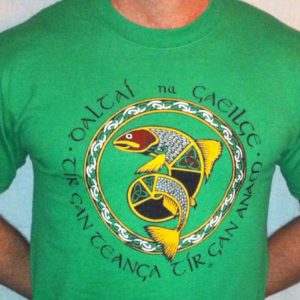Fáilte (Welcome) › Forums › General Discussion (Irish and English) › Ceist faoi “airí”
- This topic has 3 replies, 1 voice, and was last updated 7 years, 7 months ago by
Héilics Órbhuí.
-
AuthorPosts
-
September 2, 2016 at 12:07 am #36922
Héilics Órbhuí
ParticipantI have been reading “Smaointe, le Blaise Pascal”, aistrithe ag Breandán Ó Doibhlín. There is a construction that has cropped up several times lately that I believe is actually incorrect, as far as my understanding. It involves the word “airí” and is a variation on what Ó Dónaill has as “An rud is airí air = what he deserves.” The most recent example from the book I have is “..sa chaoi nach féidir dúinn a bhaint as ach go bhfuil Dia ann, agus nach airí air an cine daonna.” I have checked the English version of the text and verified that this is indeed taken to mean “and thus we cannot but conclude both that there is a God, and that men are unworthy of Him.”
My question is that, according to my understanding, it should be “agus nach airí ar an gcine daonna é”, i.e. that the thing that is “deserved” is the subject of the sentence, so to speak, and that the person deserving of it is the object of “ar”. In the example Ó Dónaill gives, “rud” is the subject and “air” denotes that “he” is deserving of it. So it appears to me that Ó Doibhlín has the construction reversed, in a sense, in that the “air” (i.e. ar Dhia) would suggest that God is not worthy of mankind (an cine daonna) and not the other way around. He uses variations of this in many places, especially in the most recent chapter and it is always the same. Am I simply misinterpreting this or is it possible such a respected author and Irish speaker could repeatedly get this wrong?
September 8, 2016 at 5:24 pm #45991Hugo
ParticipantI must admit this expression was new to me due to a serious lack of reading Irish on my part. I looked it up in the dictionaries, and googled around – finding lots of examples including the biblical “Is airi ar an oibri a thuarastal” (fadas not working) – so yes, I agree with you. Could you give the other examples of his apparent misuse of it?
September 8, 2016 at 6:08 pm #45992Héilics Órbhuí
ParticipantThanks, yeah it is not the most well-known expression but I had been aware of it previously from seeing things like “Is airí ort é’ so it immediately struck me as odd when reading this book. I’m at work at the moment, but when I get home I’ll post some other examples it has.
September 11, 2016 at 12:19 am #45994Héilics Órbhuí
Participant“Ach is fíor san am céanna go bhfolaíonn sé é féin ar an dream a chuireann tástáil air, agus go bhfoilsíonn sé é féin don dream a lorgaíonn é, de bharr gurb olc an airí ar Dhia na daoine agus gurb achmhainn dóibh é san am céanna.”
“Ní hairi air iad de thairbhe a dtruaillithe; is achmhainn dóibh é de réir a mbun-nádúr.”
There are probably others but these are the next two I was able to find.
I would have thought “… gurb olc an airí é Dia ar na daoine…” (I think that’s right anyways… that one is a bit harder)
and
“Ní hairí orthu é de thairbhe…” -
AuthorPosts
- You must be logged in to reply to this topic.
